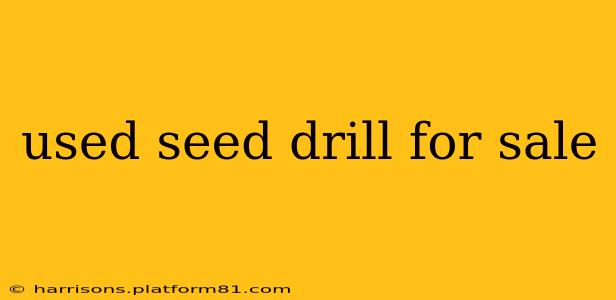Buying a used seed drill can be a smart and cost-effective way to upgrade your farming operation. However, navigating the used equipment market requires careful consideration. This comprehensive guide will walk you through everything you need to know about finding and purchasing a used seed drill that perfectly suits your needs and budget.
What Types of Used Seed Drills Are Available?
The market for used seed drills is diverse, offering a wide range of options depending on your acreage, crop type, and budget. You'll find various types, including:
- Air Seeders: These drills use air pressure to distribute seeds, offering precise placement and even distribution, especially beneficial for larger farms.
- Mechanical Seed Drills: More traditional, these drills use rotating discs or cups to plant seeds. They are often simpler to maintain and repair but may lack the precision of air seeders.
- No-Till Seed Drills: Designed for planting directly into undisturbed soil, these drills minimize soil disturbance and conserve moisture.
- Precision Seed Drills: These drills offer advanced features like GPS guidance and variable rate seeding for optimal planting accuracy and efficiency.
Choosing the right type depends on your specific farming practices and crop requirements. Consider the size of your operation, the types of crops you plant, and your budget when making your selection.
What Should I Inspect Before Buying a Used Seed Drill?
Thoroughly inspecting a used seed drill before purchase is crucial to avoid costly repairs down the line. Here's a checklist:
- Overall Condition: Check for rust, dents, and significant wear and tear.
- Seed Metering Mechanism: Ensure the seed metering mechanism is accurate and functioning correctly. Test it with different seed types if possible.
- Seed Hopper: Inspect the seed hopper for cracks or damage. A damaged hopper can lead to seed loss and uneven planting.
- Seed Tubes and Distribution System: Carefully examine the seed tubes and distribution system for blockages, leaks, or damage.
- Drills and Openers: Inspect the drills and openers for wear and tear. Replacements can be costly.
- Frame and Chassis: Check the frame and chassis for any signs of bending or damage.
- Hydraulic System (if applicable): If the seed drill has a hydraulic system, thoroughly test its functionality.
- Maintenance Records: Request maintenance records from the seller. This provides valuable insight into the machine's history and potential issues.
How Much Does a Used Seed Drill Cost?
The price of a used seed drill varies greatly depending on factors such as age, condition, make, model, size, and features. Older, simpler models might cost a few thousand dollars, while newer, more advanced drills can command tens of thousands. Researching comparable models and their prices online can help you determine a fair market value.
What are the common brands of seed drills?
Many reputable brands manufacture seed drills, and each has its own strengths and weaknesses. Some common brands include John Deere, Kinze, Great Plains, Bourgault, and others. Researching each brand's reputation for reliability and parts availability is essential before making a purchase.
Where can I find used seed drills for sale?
Used seed drills can be found through various channels:
- Online marketplaces: Websites like eBay, Craigslist, and agricultural equipment online marketplaces often list used farm equipment.
- Auction sites: Auction sites specialize in selling used farm machinery.
- Dealers: Many agricultural equipment dealers sell both new and used equipment.
- Local farmers: Networking with local farmers might lead to opportunities to buy used equipment directly from them.
What are the advantages and disadvantages of buying a used seed drill?
Advantages:
- Cost savings: Used seed drills are significantly cheaper than new ones.
- Availability: Used equipment is often readily available.
- Proven technology: Older models can still be reliable and effective.
Disadvantages:
- Higher risk of repairs: Older machines are more likely to require repairs.
- Limited warranty: Used seed drills typically come with limited or no warranty.
- Potential for hidden problems: It's harder to determine the true condition of a used machine.
By carefully considering these factors and following this guide, you can successfully navigate the market for used seed drills and find the perfect equipment for your farming operation. Remember to thoroughly inspect any potential purchase and negotiate a fair price. Happy planting!
